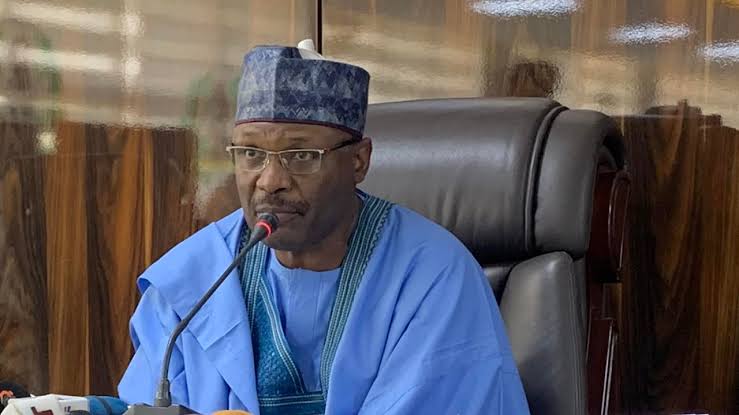The Independent National Electoral Commission (INEC) on Friday insisted that the November 11 governorship elections held in Kogi, Bayelsa and Imo states were credible.
INEC stated this in protest against a new report released by Kimpact Development Initiative (KDI) over inconsistency in the results announced by the commission and that of its Result Viewing Portal (IREV) for the elections.
The human rights organisation, which advances good governance and democratic values said the inconsistency meant high scale irregularities in the electoral system in Nigeria.
But INEC insisted that it conducted a free, fair and credible elections in the three states, adding that there were gaps in the contents of the report as presented by KDI.
While presenting the document to journalists in Abuja, Team Lead of KDI, Bukola Idowu, said the report, carried out under the Ballot Integrity Project (BIP), analysed the election results data available on the IReV and evaluated the overall integrity of the electoral process in the 2023 Bayelsa, Imo and Kogi States off-cycle governorship elections.
The documents identified persistent challenges, including discrepancies in accreditation figures and missing ballot incidents, indicating systemic weaknesses in election management.
The report also showed how the vulnerabilities in the current system may be allowing human made errors or other irregularities at the polling units to sometimes scale through the layers of audit at the ward and Local Government Areas (LGA) levels.
The study which coded all the 10,168 Polling Units (PUs) form EC8A uploaded on the IReV, also analysed results from 2,202 PUs in Bayelsa State, 4556 PUs in Imo and 3,410 PUs in Kogi State.
According to the Idowu, a total of 302 polling units’ results were not uploaded to IReV across the three states, while INEC only provided an explanation for 75 of these.
The report revealed that peculiar inconsistency surfaced in the aftermath of the 2023 Bayelsa, Imo, and Kogi off-cycle governorship election, where election day voting was designated for 10,470 polling units, excluding the 38 and two units in Imo and Bayelsa, respectively without registered voters.
The document.said contrary to expectations, the IReV showcases only 10,168 uploaded polling unit results, leaving 302 results conspicuously missing as of the time of this report.
Idowu said, “While some may believe that the missing results were simply cancelled, a further examination of the data reveals a more complex narrative. The uploaded results on IReV include instances of form EC40G upload in locations where elections were cancelled either to over-voting, BVAS failure, or violence disruptions, indicating that these anomalies were among the 10,168 results uploaded.
“Although not explicitly addressing the missing results, INEC in response to the pre-filled result sheet controversy in Kogi State took a decisive step by suspending the electoral process in 75 polling units’. This action implicitly accounted for a fraction of the 302 outstanding results. However, the remaining 227 polling units remain missing on the portal.”
The report observed that while the absence of details about 227 polling units might not sway the overall election outcome significantly, it delved into the core principles of transparency, accountability, and the commitment to open communication between Election Management Bodies (EMBs) and voters.
The document also revealed occurrence of identical handwriting across multiple results forms in Imo State, specifically in three wards (Ohaeke/Okporo, Ebenese/Umueze/nnachi Ihioma, and Ohafor/Okporo/Umutanze) in Orlu LGA, as well as the presence of multiple forms with the same handwriting in Ogberuru/Obibi ward.
The report said the development raised significant concerns about the authenticity and integrity of the election results in these areas.
“In all of the polling units in these wards, the numbers of voters accredited electronically by BVAS, as released by INEC, were conspicuously missing on the |ReV platform. This is indicative of the possibility that no BVAS was potentially used, suggesting a potential absence of voting.
“This observation suggests the possibility of result manipulation and raises questions about the transparency and fairness of the electoral process in these specific wards. The use of the same handwriting across numerous election results raises several potential concerns and could be indicative of irregularities or manipulation in the electoral process”, the report said.
Idowu called on INEC to institute a robust and transparent post-election audit process that involves thorough scrutiny of election results, with a focus on identifying and rectifying any inconsistencies, arithmetic errors, or irregularities.
He said, “What the KDI did was to look at the results released by INEC on IREV. What we did was to tabulate everything and do a statistical analysis of exactly what they released on IREV. What we find that was that there are bits of inconsistencies in some of the police unit. And the summary of it was that, it looks INEC has to take take a second look at the results declared and see how they can correct them. Because it looks like we have lot of mistakes and irregularities.
“We saw where ballots were missing. We saw over-voting, arithmetic error, BVAS lack of synchronisation, among others. We saw a lot of these irregularities that can really affect the election and basically what we are saying is how do you correct this. We know the election is passed but this what we can assess so that INEC can improve in future.”
But in her response to the report, INEC Assistant Director (Electoral Operations), Anne Aderibigbe, observed that the research is only partially complete, as it is limited to only one of the mechanisms, which is the IREV put in place to check the integrity and consistency of election result.
She said, The researchers have no access to our back-end integrity process, such as the accreditation of the data, use of BVAS at the very first level of collation, such as the number of polling units and wards that were cancelled and has such no impact to the final declaration of the results.”
Aderibigbe said the commission also employ the collation support and results verification system, deployed at the Ward collation level, adding that the system is an integral and germane integrity check of ballots, processes and BVAS.
She said, “Most of the issues raised in the study as presented here are precisely the subject of these integrity checks. And so when you remove this integrity check mechanism from the whole of this study, a lot is yet to be completed with this study. So this study dealt with only the PU results.”



